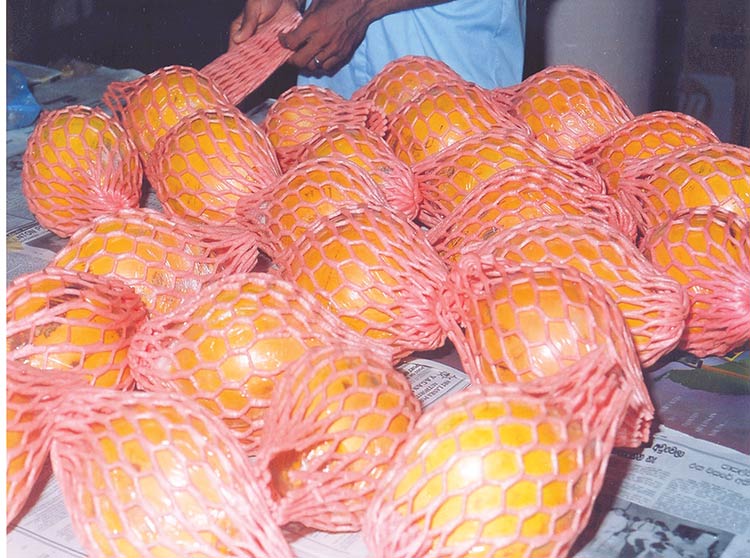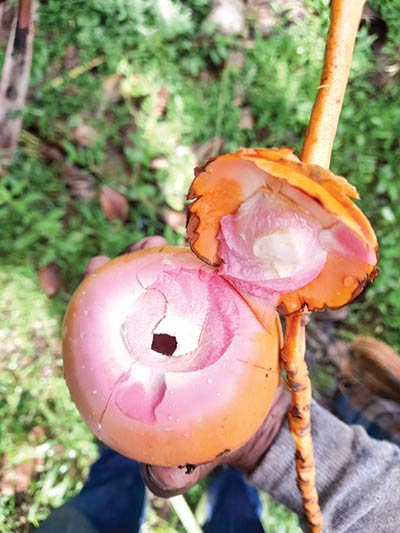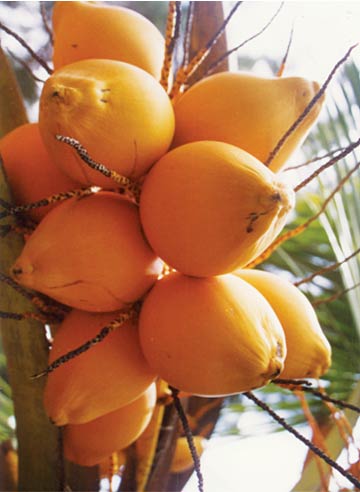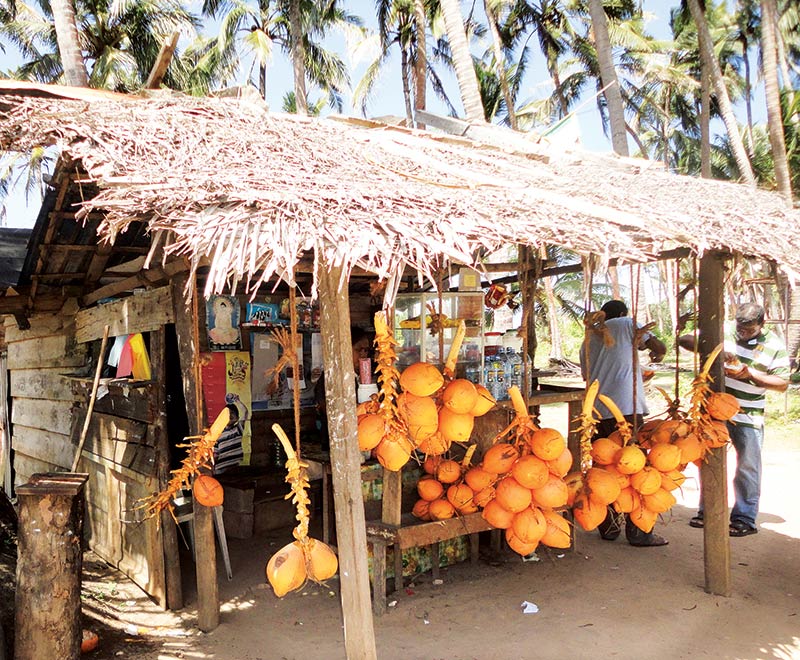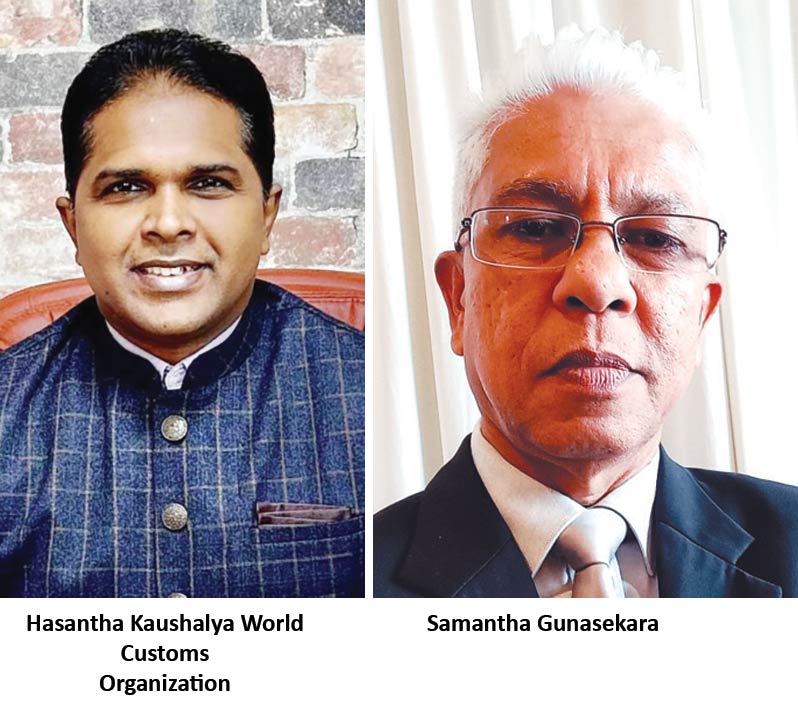Life style
can Fenugreek Lower Blood Sugar
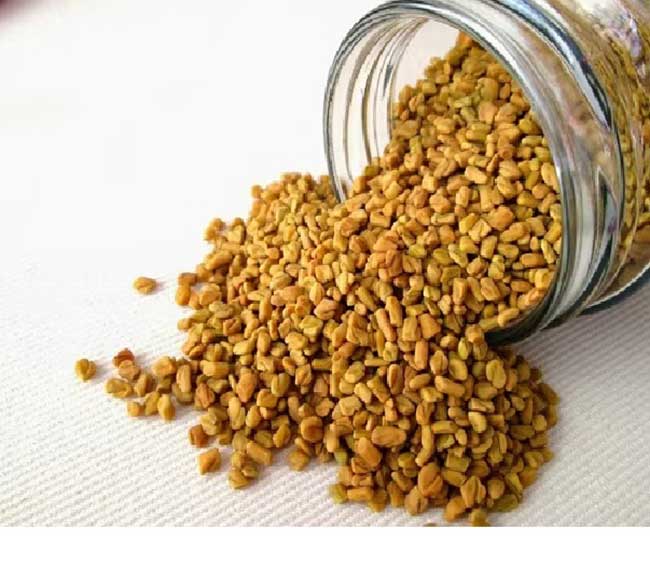
enugreek is a plant that grows in parts of Europe and western Asia. The leaves are edible, but the small brown seeds are famous for their use in medicine.The first recorded use of fenugreek was in Egypt, dating back to 1500 B.C. Across the Middle East and South Asia, the seeds were traditionally used as both a spice and a medicine.
You can buy fenugreek as:
a spice (in whole or powdered form)
supplement (in concentrated pill and liquid form)
tea
skin cream
Mind-Blowing Benefits of Fenugreek Seeds for Skin, Hair, and Health
Mind-blowing-benefits-of-fenugreek-seeds-for-skin-hair-and-healthlthough, the seeds are a bit bitter in taste but are highly nutritious in nature and gently roasting them could change the flavor of the seeds.
The fenugreek seeds boast of plenty of vitamins like vitamin A,C,K, B6 and even includes minerals like potassium, copper, and zinc etc. These seeds have good deal of benefits to it.
Glowing Skin
The presence of vitamin C in fenugreek seeds lightens the skin complexion and gives it a beautiful glow. Make a paste of soaked fenugreek seeds and apply it on your face as a mask for a brighter, clearer skin! You can also mix a tablespoon of fenugreek seed powder with some milk to make a paste. Apply this pack as a facial mask for a naturally glowing skin.
Cleanses Skin
Fenugreek seeds soaked in water overnight and blended into a paste work as a superb skin cleanser. Applying this paste as a mask on your skin cleanses it deeply. You can also use the leftover water used in soaking these seeds to remove excess oils and dirt from your skin using a cotton swab.
Facial Toner
The water used in soaking fenugreek seeds can be used as a facial toner. Soak fenugreek seeds in water overnight, then store that water in a spray bottle. Spray this concoction on your clean face before applying moisturizer on your skin.
Exfoliates Skin
Rather than using regular scrubs that are chemical-based and contain microplastic beads made up of petroleum products to exfoliate the skin, use fenugreek seeds paste instead! Grind the soaked fenugreek seeds into a scrub like paste and gently rub it on your skin. It not only removes the dead skin cells but also reduces excess oil from the skin.
Moisturizes Skin
Is your skin rough, dry, or flaky? If yes, then go for fenugreek seeds face mask! These seeds nourish and moisturize the skin by removing all the dryness. Soak some fenugreek seeds in hot water overnight. In the morning, grind them with 2 tablespoons of yogurt and 1 tablespoon of honey. Apply this pack on your face and rinse it off after 15 minutes.
Reduces blemishes and dark circles
Dirt, bacteria, and dead skin cells are the main reasons behind dark spots on the skin. Fenugreek seeds contain vitamin K and vitamin C that help in reducing blemishes and dark circles from the skin. Using the fenugreek seeds face mask removes all the impurities from the skin helping it to glow naturally. Soak some fenugreek seeds in water overnight and grind it with plain milk the next morning. Apply this paste on your washed face and let it stay for some time until it dries. Later Rinse it off.
Anti-Aging Properties
These small golden seeds are imbued with compounds which keeps your skin beautiful, young, and wrinkle-free. They kill the free radicals which cause wrinkles and dark spots on the skin. The mask made with fenugreek seeds or the fenugreek seeds’ water helps in firming, tightening, and rejuvenating of your skin.
Cure Acne
People having acne problem must give fenugreek seeds a try as they are enriched with anti-bacterial properties. Boil fenugreek seeds in good amounts of water for about 15 minutes. Strain the water and let it cool. Apply this liquid on your face with the help of a cotton ball.
Prevents Hair Loss
Are you fed up of tackling the woes of hair loss? Look for the fenugreek seeds in your spice box as it might be just what you require. Fenugreek seeds are very effective in making the hair strong from their roots and dealing with the follicular problems. These seed fights irritation on the scalp and dandruff, which are two key reasons for hair loss.
To prevent hair loss, soak some fenugreek seeds for the whole night and blend them with some water and lemon juice. Apply this hair mask and then rinse off.You can also soak some of these seeds in coconut oil in a bottle. Place this bottle in a cool place for about ten days. After 10 days, filter this oil and massage your hair with it.
Fights Dandruff
Dandruff can make you scratch your head and irritate you. This can weaken your hair which eventually leads to fall out of the hair. Blame fungi and bacteria for this! While they are somehow present on the scalp, an imbalance in their numbers can lead to dandruff. Thankfully, both antibacterial and antifungal properties of fenugreek seeds make it useful to treat an itchy scalp and dandruff. Using a mask made with fenugreek seeds is great way to get rid of dandruff. For the mask, Make a paste of soaked fenugreek seeds with some yogurt. Apply this paste on your hair leaving it for half an hour. Wash off. Repeat this process twice in a week. – BBC
For Shiny Conditioned Hair
Who doesn’t want shiny and luscious hair and that too naturally? Firstly, stop using the chemical-based shampoos and conditioners for a silky smooth hair, and embrace the fenugreek seeds in your hair diet. These seeds not only condition the hair strands but also their roots and follicles.
Grind 1/2 cup soaked fenugreek seeds, 1/2 cup yogurt, lemon juice, and water together and make a thick paste. Apply this mask on your hair and wash your hair after 45 minutes with a mild shampoo.Soak fenugreek seeds overnight in water. In the morning, you can apply the slimy water used to soak the seeds in your hair.
Promotes Hair Growth
Fenugreek seeds not only kills the bacteria and fungi present on the scalp but strengthen the hair follicles and promote hair growth. Blend 1/2 cup soaked fenugreek seeds, 1 tablespoon aloe vera gel, 1 tablespoon coconut oil, and 6-7 drops of rosemary oil together. Apply this hair mask on your scalp. Let it sit for about 30-40 minutes before rinsing it off.
Prevents Premature S Grey Hair
Greying of hair is considered natural as you grow old. If this problem becomes evident in young adults in their 20’s then it a problem. Although grey hair is a fashion trend nowadays, yet it is taken as premature and unnatural. The high content of potassium in fenugreek seeds makes it an important kitchen spice which is capable of tackling premature greying of hair.
You can simply apply the paste of soaked fenugreek seeds on your hair and let it sit for about half an hour. Rinse off. Add amla juice (extracted from raw amla) to the fenugreek seeds paste, and apply it to your scalp and hair. Wash it after one hour with a mild shampoo.
Fenugreek seeds benefits for health
Encourages Weight Loss
A slim and fit body is appealing! If you want to shed those few extra kilos, include fenugreek seeds in your diet! These seeds encourage a feeling of satiation and appetite suppression and weight loss. Soak one tablespoon of fenugreek seeds in 2 glasses of water. Strain the water in the morning and drink this health tonic on an empty stomach.
Helps in digestion
Consuming fenugreek seeds on a daily basis help improve the bowel movements. They are widely known to fight against all the digestive problems and acid refluxes. These seeds are a good source of antioxidants and fiber, which help in flushing out dangerous toxins from the body. Drinking water in which fenugreek seeds are soaked is an ideal remedy to help in digestion.
Reduce your cholesterol
Eating fenugreek seeds for cholesterol is the popular remedy. It prevents intestines from absorbing cholesterol, thereby reducing the cholesterol levels. These seeds lower the Low Density Lipoprotein(LDL) cholesterol along with triglycerides without having any effect on the High Density Lipoprotein (HDL) levels. You can drink the water used for soaking these seeds to control your cholesterol.
Improves diabetes symptoms
A diabetes patient must have these seeds or leaves in their diet. The fenugreek seeds contain amino acids which help in the production of insulin in the pancreas. Insulin will lower the blood sugar levels in the body. Moreover, the presence of galactomannan in the seeds reduces the absorption of sugar and carbohydrates into the blood.
Reduce menstrual cramps
These seeds contain compounds which help in reducing the symptoms like discomfort and menstrual cramps related to Premenstrual Syndrome (PMS). Chewing some soaked fenugreek seeds calms menstrual cramps and mood swings due to PMS. This will provide long-lasting and immediate relief from the pain of menstrual cramps.
Reduces Arthritis Pain
The anti-inflammatory and antioxidant properties of fenugreek seeds help in lowering the pain arising from arthritis. Drinking fenugreek seeds’ water helps in alleviating arthritis pain.
Lowers risk of heart disease
The presence of galactomannan in the fenugreek seeds makes it a good remedy to maintain heart health. The seeds also have a high amount of potassium that opposes the action of sodium and control heart rate and blood pressure.
Improve Kidney Function
Consuming fenugreek seeds is good for better functioning of the kidneys. These seeds have polyphenolic flavonoids that boost kidney function and prevents the damaging of cells by forming a membrane around them.– BBC
Life style
King of coconuts heads for a golden future
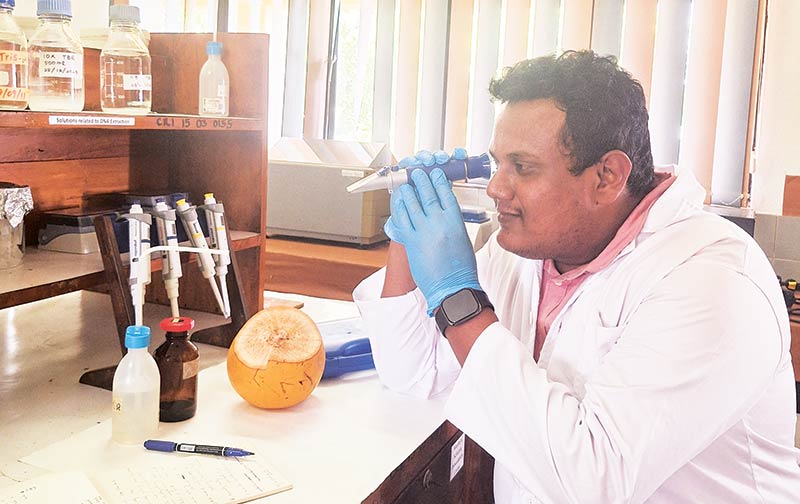
Characterized by its golden exterior, Sri Lankan King coconut or thambili is endemic to the island. In a bid to tap a premium global niche market for this golden nut which traditionally equaled the modern-day saline, the Coconut Research Institute has embarked on ambitious research which is promised to be a ticket in obtaining Geographical Indication (GI) Certification for the much-loved thirst quencher.
BY RANDIMA ATTYGALLE
Traditionally in Sri Lanka, a guest is welcomed with a tall glass of refreshing thambili water. A popular pre-lunch drink, thambili translating to ‘king coconut’ befits this golden-hued nut endemic to Sri Lanka. Thambili is an integral part of many Lankan lives. From being an organic thirst-quencher to a notable base of ayurvedic medicines, this king of nuts even occupies the pride of place in religious and cultural landscape of the island.
Bunches of thambili are often used for decorative purposes at traditional cultural festivals. Naturally sterile, thambili water had been a trusted antidote of native physicians since time immemorial. A traditional substitute for modern day life-saving saline, a bottle of thambili water or even a bunch of thambili was often taken by locals when visiting a recovering patient. Its jelly-like kernel commonly called londha is another edible delight.
Endemic variety
“In many coconut-growing countries, there are primarily two types of coconut palms: Tall and dwarf. Only a few countries have recorded intermediate types, and Sri Lanka has one such variety called Aurantiaca, which means orange coloured in Latin. Within this variety, there are four types of coconut, including king coconut – Nawasi Thambili, Rathran Thambili, and Bothal Thambili. King Coconut is considered endemic to Sri Lanka. Although populations with a similar appearance have been recorded in other countries, they belong to the red dwarf variety. Only Sri Lanka has a well-distributed population of king coconut,” says Dr. Auchithya Dissanyaka, Head of the Genetics Implant Division of the Coconut Research Institute of Sri Lanka (CRI).
GI for a premium price
In a backdrop where the demand for thambili or Sri Lankan king coconut in the international market is on the rise, the CRI is now in the process of differentiating the other dwarf varieties from the Sri Lankan king coconut. The effort is perceived to be a gateway in obtaining the Geographical Indication (GI) certification for our thambili.
GI is an international labeling system that identifies a product originating from a specific geographical area. It recognizes qualities, characteristics, or the product’s reputation that are importantly linked or attributable to its location. GI-certified products which have the international protection are also at an advantage of fetching a premium price over non-GI competitos. Sri Lanka obtained its first-ever GI certification in 2022 for ‘Ceylon Cinnamon’ from the European Union.
Booming beverage industry
Our king coconut is mainly exported as whole nuts and bottled/canned coconut water. From only 2.96 million nuts in 2014, local king coconut exports have risen to 12.91 million nuts as of 2023. The natural beverage industry is also booming in the international market, creating a high potential for the coconut water industry to become a high-value export industry. In 2022, the coconut water market was worth USD 5.2 billion, and it is estimated to increase to USD 20.24 billion by 2030 (zionmarketresearch.com).
“While other coconut water exporting countries use water from either tall or dwarf varieties, Sri Lanka has a unique opportunity to compete in the international market with its indigenous king coconut variety which is of intermediate type. Brazilian Green Dwarfs and Aromatic Green Dwarfs from Thailand are two main coconut varieties in the beverage coconut industry. To successfully compete in the international market, it is crucial to distinguish king coconut from other varieties in the global market,” remarks Dr. Dissanayaka.
The scientists at the CRI are presently conducting molecular and biochemical studies for this purpose, she says. They are also in the process of collecting king coconut germplasm to establish a gene bank to conserve the genetic material of king coconut. “We are selecting best mother palms across the country to go for island-wide characterization and we are almost nearing completion. Following that, we are moving into specific characterization which will differentiate our king coconut from other varieties,” explains the scientist. The project is supported by connected institutions of the CRI including the Coconut Development Board and the Coconut Cultivation Board.
Ongoing research
In addition to the Morphological and Molecular diversity related researches on germplasm conservation which will generate information required to obtain GI, CRI’s king coconut research branches out to several other areas. “We are also carrying out nursery experiments to enhance effective seedling production, floral biology related researches to enhance the breeding programmes and mother palm collection to produce seedlings with good genetic potential,” explains Research Officer, Genetics and Plant Breeding Division of the CRI, Oshan Thilakarathne.
Sri Lankan king coconut is still largely confined to home gardens although several plantation companies have now come forward to expand the cultivation to plantation level. “The fact that our nuts are largely sourced from home gardens also render it to be fully organic – a factor which enables us to maintain a niche in the international market,” says Thilakarathne who goes onto cite its health properties. “It is a natural beverage high in minerals and is ideal as a sports drink today. In Ayurveda, king coconut water is used to treat renal and urinary tract related diseases.” King coconut water is also considered a dietary antioxidant.
Growing export market
Sri Lanka’s king coconut export market is growing and the possible GI Certification could take it to the next level, says CRI’s Senior Research Officer Nilmini Jayalath. “Ever since we started exporting from around 2010, our king coconut export volume has grown bigger and last year we exported 12.9 million nuts. Our leading buyers are the Middle Eastern countries, Singapore, Maldives, Japan, France, Switzerland, and Germany.” Although king coconut water is exported in value added forms such as in sachets, bottles and in cubes, the demand for ours as whole nuts is much bigger because in the international market, the demand for the natural form is intense,” says the Senior Research Officer.
The scarcity of nuts is one of the major challenges to reach the full potential of our king coconut exports remarks Jayalath. “Local consumption alone demands increased volumes and during the last dry season the nut price went up to Rs 200-250 in the local market. Therefore, to increase the availability of nuts, the Coconut Cultivation Board has initiated many schemes including king coconut villages,” notes the scientist.
Harnessing new technology
In addition to the king coconut characterization studies, the comprehensive research programme on king coconut includes the development of tissue culture technology, and strategies to mitigate the seasonality of production. “By addressing these aspects, CRI aims to not only boost yields but also ensure that the industry can meet growing consumer demand year-round,” says Dr. Nayanie Aratchige, Acting Director of the CRI.
The CRI has developed technology to increase the shelf life of young king coconuts, aiming at enhancing the export potential. The new technology developed by the CRI encompasses the largely untapped potential of king coconut trade due to challenges in preservation and transportation, offering solutions that enhance the shelf life and quality of nuts. “Preserving the freshness and nutritional value of king coconut during transit enables tapping distant markets without compromising quality. Producers and exporters can access further information and learn about our trainings by calling the CRI on the short code 1928,” Dr. Aratchige concludes.
(Pic credit- Coconut Research Institute, Wikipedia)
Life style
Stolen from the wild: Confronting the crisis of illegal wildlife trade and biopiracy

Nations Trust WNPS Monthly Lecture
By Samantha Gunasekara & Hasantha Kaushalya
Thursday, November 21, 6 pm, Lotus Hall, BMICH
The Wildlife and Nature Protection Society (WNPS) is committed to driving awareness and action on critical conservation issues. Through its monthly lecture series, WNPS brings to the forefront the often-overlooked crisis of illegal wildlife trade (IWT) and biopiracy—issues that threaten not only Sri Lanka’s biodiversity but the global ecological balance. The November edition of Nations Trust WNPS lecture aims to shed light on the dark underworld of wildlife trafficking, expose legal gaps, and highlight the need for collective action to protect natural heritage.
Illegal wildlife trade is a high-stakes, clandestine operation that generates up to $23 billion annually, fueled by complex networks that exploit animals, plants, and entire ecosystems. Despite global regulatory efforts like CITES, the trade continues to grow in sophistication, often outpacing enforcement. Sri Lanka’s unique wildlife, including endangered species like pangolins and star tortoises, is particularly vulnerable to collection, poaching and trafficking, with devastating impacts on ecosystems and biodiversity.
Illegal wildlife trade devastates biodiversity, but biopiracy—exploiting resources through patents—adds a serious, emerging threat. The shift toward Digital Sequence Information enables entire genomes of Sri Lanka’s unique species to be exploited, often without consent or awareness.
This month’s lecture presents a unique opportunity for the public and stakeholders to confront these alarming trends and to understand the role they can play in dismantling the networks that fuel IWT. WNPS invites all who care about wildlife conservation to join this critical session and take a stand against the exploitation of Sri Lanka’s natural resources.
This lecture features two of Sri Lanka’s leading experts on IWT:
Samantha Gunasekara
Samantha Gunasekara, former Deputy Director of Customs, is a leader in wildlife protection, credited with establishing World’s first customs Biodiversity protection cell and has over 30 years in wildlife crime detection and anti-corruption in wildlife crimes. He has led significant efforts in wildlife crime detection, initiated the Sri Lanka Customs Museum, and contributed to national conservation efforts. Recognized with the Presidential Environmental Award, he serves on multiple biodiversity committees and is a sought-after lecturer in conservation.
Hasantha Kaushalya
Hasantha Kaushalya is a prominent figure in counter-wildlife trafficking with over 15 years of experience at Sri Lanka Customs. As a World Customs Organization (WCO) accredited expert on Illegal Wildlife Trade (IWT), he has led technical missions and training workshops for Customs authorities across Asia and Africa. Known for his expertise in detecting and investigating cross-border wildlife crimes in Sri Lanka, Hasantha has also developed a comprehensive training program to strengthen wildlife trafficking enforcement within Customs. His achievements have earned him the 2023 WCO Certificate of Merit for knowledge-sharing and the Wildlife Law Enforcement Excellence Award from the Sri Lanka Wildlife Enforcement Network (SLaWEN)..
The lecture is supported by Nations Trust Bank and is open to both members and non members. Entrance Free.
Life style
Jetwing Hotels wins the Global Responsible Tourism Award
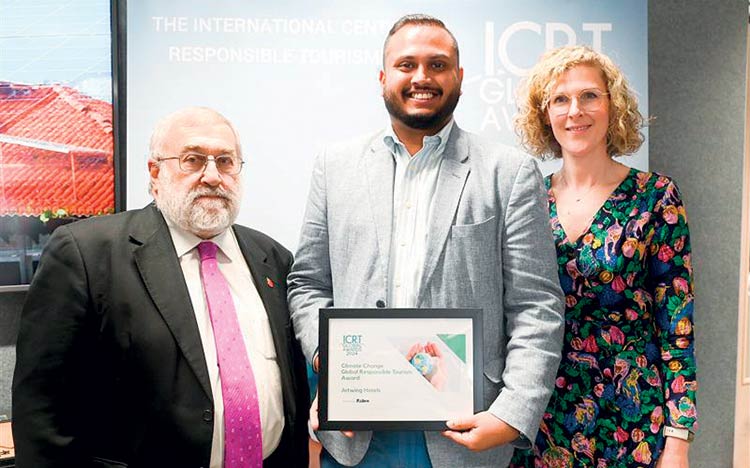
Jetwing Hotels was recently recognized for its contribution to climate action at the recently concluded Global Responsible Tourism Awards 2024, sponsored by Sabre, held in London.
The Global Responsible Tourism Awards has honored six exceptional tourism operators across various categories. These winners, hailing from Africa, Latin America, the Indian subcontinent, Southeast Asia, and the rest of the world, previously secured gold medals in their respective regional competitions. The 33 regional gold winners then advanced to the global stage, vying for recognition in the 20th anniversary year of the awards.
Harold Goodwin, founder of the International Centre for Responsible Tourism, emphasized the importance of concrete action in sustainable tourism. He stated, “Too often, ‘sustainable’ is used abstractly. Responsible Tourism demands tangible actions to improve tourism and transparent reporting of achievements. Today’s award winners exemplify these principles, offering evidence-based, replicable, and innovative approaches that inspire and influence others.”
Tess Longfield, Sabre’s head of sustainability communications and award sponsor, echoed this sentiment, expressing admiration for the finalists’ dedication to sustainable and equitable tourism. She added, “Their passion and commitment to creating a positive impact through travel is truly inspiring. It underscores the power of responsible tourism to make a real difference.”
The judges in the climate action category sought organizations actively decarbonizing tourism operations and pioneering innovative strategies for climate resilience and business continuity. Since introducing its first solar PV system in 2010, Jetwing Hotels has steadily expanded its renewable energy footprint, investing over USD 1 million in 2024 to increase capacity by 1.6 MW. In 2023 alone, Jetwing Hotels generated 1,069 MWh of clean energy, powering 13,490 households and offsetting 608 metric tons of CO2 emissions. The ongoing expansion, currently 90% complete, will further bolster solar PV capacity, tripling its contribution to 24% of total electricity consumption. Beyond solar power, Jetwing Hotels has adopted a holistic approach, incorporating biomass boilers, steam-powered chillers, solar thermal systems, and biogas digesters to achieve over 60% of its energy demand from renewable sources. These efforts further align with Sri Lanka’s renewable energy goals and demonstrate Jetwing Hotels’ dedication to a sustainable future.
Dmitri Cooray, Managing Director of Jetwing Hotels, accepted the award in London, stating, “By advancing energy independence and fostering a culture of environmental responsibility among our staff and guests, we ensure our business practices are both environmentally sound and economically sustainable. Our success demonstrates that even small steps can create a significant impact, inspiring others to take action.” With a legacy spanning over half a century in the tourism industry, Jetwing Hotels has established itself as a pioneer in curating unique experiences and offering legendary Sri Lankan hospitality. As a family-owned brand, Jetwing continues to be a leading advocate for sustainability and responsible tourism, guided by a comprehensive strategy focused on community upliftment, climate action, environment conservation, and resource efficiency. The brand’s diverse portfolio includes a range of luxury hotels and villas, each offering a unique perspective on Sri Lanka’s rich cultural heritage and natural beauty.
-
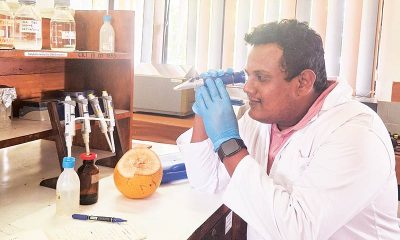
 Life style3 days ago
Life style3 days agoKing of coconuts heads for a golden future
-
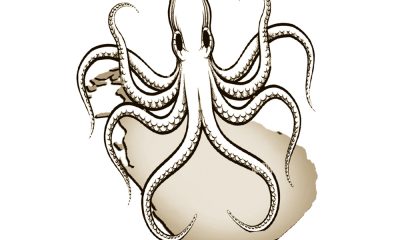
 Features7 days ago
Features7 days agoAdani’s ‘Power’ in Sri Lanka
-

 Latest News4 days ago
Latest News4 days agoColombo district preferential votes announced
-

 News4 days ago
News4 days agoPresident warns his party: “We will fail if we view power as an entitlement to do as we please”
-
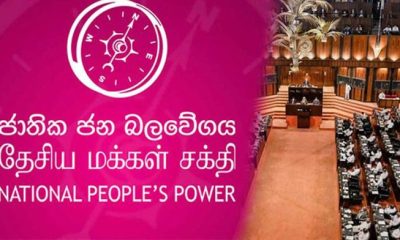
 News2 days ago
News2 days agoNPP appoints two defeated candidates as NL MPs
-

 Editorial7 days ago
Editorial7 days agoWhen millers roar and Presidents mew
-

 Midweek Review7 days ago
Midweek Review7 days agoGamani Corea:
-

 Latest News5 days ago
Latest News5 days agoGampaha district: NPP 16, SJB 3


